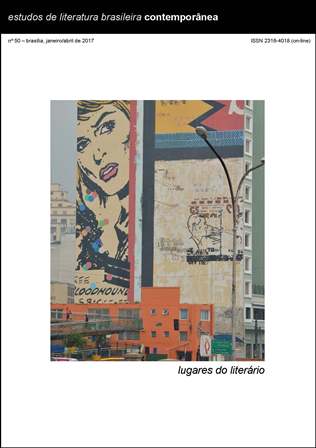Contos de fadas da memória em Baú de ossos, de Pedro Nava
DOI:
https://doi.org/10.1590/2316-4018505Abstract
Situada em relação à problematização pós-moderna do conhecimento histórico, a prosa memorialística, mesmo se transformada em arte, tem sido descrita em relação à memória, mais que em relação à história. Baseado em um criticismo biográfico e histórico, este artigo pretende discutir a presença dos contos de fadas nos escritos de Pedro Nava sobre suas memórias de infância em Baú de ossos (1972) e expor como esses relatos são estruturados pelos discursos autobiográfico e ficcional.
References
ABREU, Alzira Alves (Coord.) (2001). Dicionário histórico-biográfico da Primeira República (1889-1930). Rio de Janeiro: FGV.
BENJAMIN, Walter (1994). O narrador: considerações sobre a obra de Nikolai Leskov. In: BENJAMIN, Walter. Magia e técnica, arte e política: ensaios sobre literatura e história da cultura. Tradução de Sérgio P. Rouanet. São Paulo: Brasiliense, p. 197-221.
BETTELHEIM, Bruno (2002). A psicanálise dos contos de fadas. Rio de Janeiro: Paz e Terra.
BEWERNICK, Hanne (2010). The storyteller’s memory palace. Frankfurt: Peter Lang.
BLOOM, Harold (1980). Wallace Stevens: the poems of our climate. Ithaca; London: Cornell University Press.
CASCUDO, Luís da Câmara (1984). Literatura oral no Brasil. Belo Horizonte: Itatiaia.
CASCUDO, Luís da Câmara (1999). Contos tradicionais do Brasil. Rio de Janeiro: Ediouro.
CASTRO, Francisco de (1780-1789). Dios y la naturaleza. Compendio histórico, natural, y político del universo, en que se demuestra la existencia de Dios, y se refiere la historia natural y civil, la religión, leyes, y costumbres de las naciones antiguas, y modernas más conocidas del Orbe. Madrid: Joachin Ibarra, 10 v.
DENTE, Carla (2015). Reality, theatre and human wrights. In: WARD, Ian (Ed.). Literature and human rights: the law, the language and the limitations of human rights discourse. Berlin; Munique; Boston: De Gruiter, p. 183-195.
DINIZ, Alberto (1943). Vida que passa: memórias. Rio de Janeiro: Imprensa Nacional, 1943.
DRAGAS, Areti (2014). The return of storyteller in contemporary fiction. London: Bloomsbury.
FORD, Andrew (1992). Homer: the poetry of the past. Ithaca; London: Cornell University Press.
FREUD, Sigmund (1996). Luto e melancolia. In: FREUD, Sigmund. Edição standard brasileira das obras psicológicas completas de Sigmund Freud. Rio de Janeiro: Imago, v. XIV, p. 271-291.
HUNTINGDON, Henry (1996). Historia anglorum: the history of the English people. Edited and translated by Diana Greenway. Oxford: Clarendon Press. (Oxford Medieval Texts).
LACAPRA, Dominick (1998). History and memory after Auchwitz. Ithaca: Cornell University Press.
LE GOFF, Jacques (1996). História e memória. Campinas: Editora da Unicamp.
LOBECK, Justo Florian (1862). Ojeada retrospectiva sobre la marcha que, desde los tiempos antiguos hasta nuestros dias, se ha seguido al tratar de la mitolojía clásica. Anales de La Universidad del Chile, Santiago, tomo 21, serie 1, p. 633-655.
NAVA, Pedro (1974). Baú de ossos. Rio de Janeiro: José Olympio.
NEHER, André (1984). L’essenza del profetismo. Genova: Marietti.
PURVES, Alex C. (2010). Space and time in ancient Greek narrative. New York: Cambridge University Press.
SILVA, Maria de Fátima; J. A. LÓPEZ FÉREZ (Ed.) (2000). La comedia griega y su influencia en la literatura española, Madrid, Ed. Clásicas, 1998. Resenha. Humanitas, Coimbra, v. 52, p. 350-355. Disponível em: <https://goo.gl/u2yHXx>. Acesso em: 28 nov. 2015.
WATSON, Walter (2012). The lost second book of Aristotle’s “poetics”. Chicago: University of Chicago Press.
WEISMANN, Gary (2010). Questioning key texts: a pedagogical approach to teaching Elie Wiesel’s Night. In: BLOOM, Harold (Ed.). Elie Wiesel’s Night. New York: Infobase Publishing, p. 137-46.
WHITE, Harry (2008). Music and Irish literary imagination. New York: Oxford University Press.
Downloads
Published
Issue
Section
License
Authors who publish in this journal agree to the following terms:
a) The authors maintain the copyright and grant the journal the right of first publication, the work being simultaneously licensed under the Creative Commons Attribution License-Non Commercial 4.0 which allows the sharing of the work with acknowledgment of the authorship of the work and publication this journal.
b) Authors are authorized to enter into additional contracts separately, for non-exclusive distribution of the version of the work published in this journal (eg publish in institutional repository or as a book chapter), with authorship recognition and publication in this journal.
c) Authors are allowed and encouraged to publish and distribute their work online (eg in institutional repositories or on their personal page) after the editorial process, as this can generate productive changes, as well as increase the impact and citation of published work (See The Effect of Free Access).
d) The authors of the approved works authorize the magazine to, after publication, transfer its content for reproduction in content crawlers, virtual libraries and the like.
e) The authors assume that the texts submitted to the publication are of their original creation, being fully responsible for their content in the event of possible opposition by third parties.


